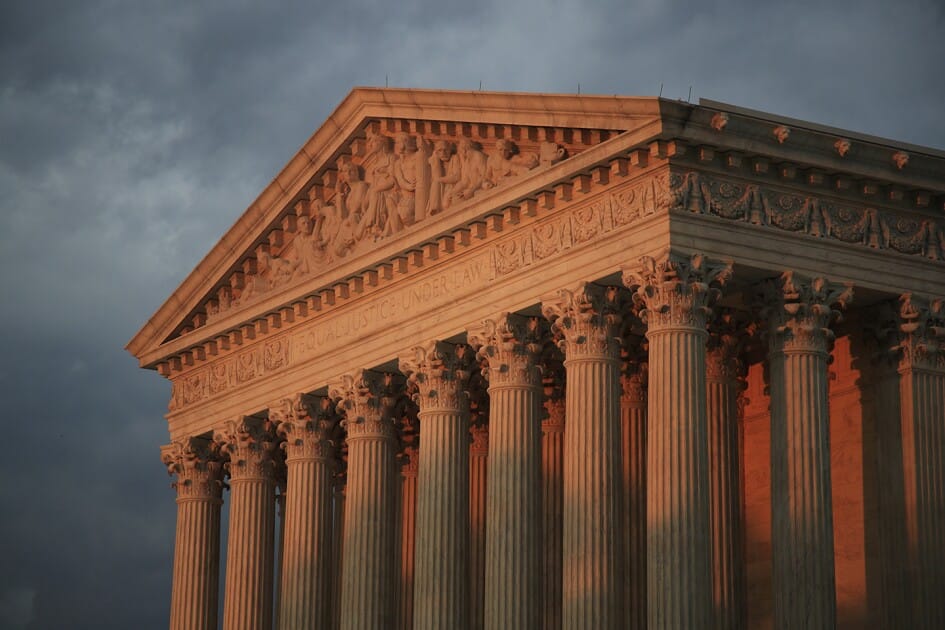The U.S. Supreme Court on Monday declined to take up a case about a Maryland school district’s policies to support transgender students and when parents may challenge them.
The court’s action in Parents 1 v. Montgomery County Board of Education was not a decision on the merits, but the case is emblematic of a widespread national debate over gender identity policies in public schools and parental rights.
“Schools across the country over the past few years have adopted policies similar to that involved here that require school personnel to hide from parents—lying if need be—that the school is assisting their child to transition gender at school,” said the appeal filed by three unidentified parents in their case against the 160,000-student Montgomery County district outside the nation’s capital.
The parents contend that what they call a “parental preclusion policy” calls for school personnel to support gender-transitioning students to change their names, pronouns, and how they “exhibit” their gender without officials consulting or even notifying parents. They argued that the policy violates their 14th Amendment due process right to direct the upbringing of their children.
The school district said in its Supreme Court brief that its “Guidelines for Gender Identity,” adopted in advance of the 2020-21 school year, call for collaboration with parents in developing a gender support plan for a transitioning student.
But when the student’s parents are deemed non-supportive, the guidelines “acknowledge the reality that, ’in some cases, transgender and gender-nonconforming students may not openly express their gender identity at home because of safety concerns or lack of acceptance,’ and, in light of that reality, indicate that student support and safety is an overarching goal,” the district said, quoting from the guidelines.
The parents’ lawsuit was dismissed in 2022 by a federal district court. Last year, a panel of the U.S. Court of Appeals for the 4th Circuit, in Richmond, Va., ruled 2-1 that the parents lacked standing to sue over the guidelines because none of their children had gender-support plans or had any discussions with school officials about gender transitioning or gender identity issues.
Writing for the majority, Judge A. Marvin Quattlebaum Jr. said the guidelines are “staggering from a policy standpoint” and may be “an overreach into areas that parents should handle.”
But the parents “have not alleged facts that the Montgomery County public schools have any information about their children that is currently being withheld or that there is a substantial risk information will be withheld in the future,” he said.
In dissent, Judge Paul V. Niemeyer said the majority’s view of parental standing was “unfairly narrow” in this case and subjected parents “to a mandatory policy that pulls the discussion of gender issues from the family circle to the public schools without any avenue of redress by the parents.”
Niemeyer also cast doubt on the legality of the district’s guidelines, saying they usurp “the constitutionally protected role” of parents.
School districts’ policies on transgender students facing legal challenges
The parents, backed by the National Legal Foundation of Chesapeake, Va., also had support from several conservative groups and Republican-led states in the Supreme Court. A friend-of-the-court brief filed by West Virginia and 16 other red states said, “Parents must have the right to ask for the courts’ help in securing the fundamental right to know what schools are doing with their kids.”
The parents and the states both cite statistics from the grassroots group Parents Defending Education that more than 1,000 districts nationwide have policies for transgender and gender non-conforming students that “openly state that district personnel can or should keep a student’s transgender status hidden from parents.”
The Montgomery County school district told the court in its brief that the 4th Circuit was correct in ruling that the parent challengers lacked standing. It said there are several cases across the country alleging that school districts denied information about a child’s gender transition to that child’s parents.
If the parents and their supporters “are correct that similar cases are percolating through the lower courts, then the [Supreme] Court should address these issues, if at all, in litigation that presents an actual case or controversy,” the district said.
This is not the only LGBTQ+ controversy in the Montgomery County district. Last week, a separate 4th Circuit panel issued a decision that refused to block the district’s policy preventing parents from opting their children out of LGBTQ+ inclusive “storybooks” used in its elementary schools.
2024-05-20 17:59:14
Source link

